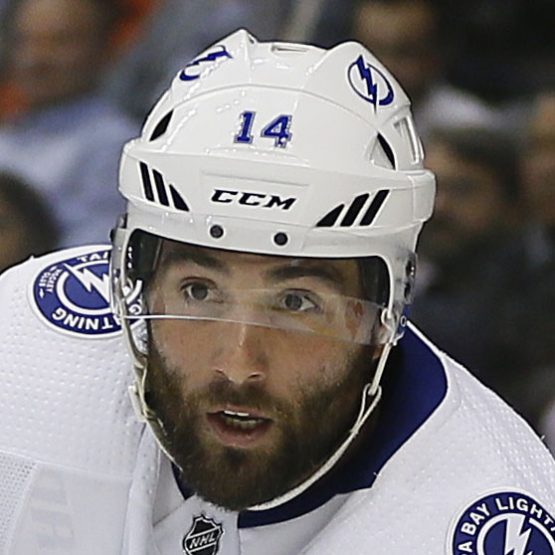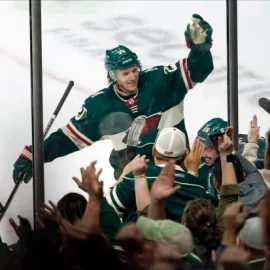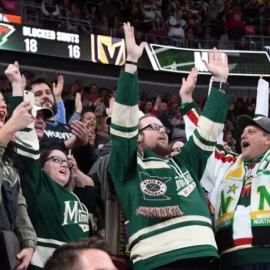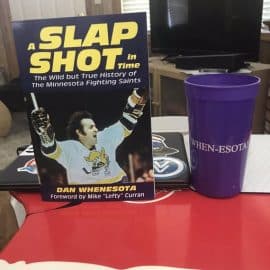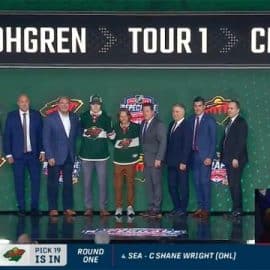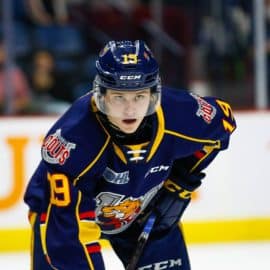
“Then you better start swimmin’, or you’ll sink like a stone, for the times they are a changin,'” is the almost parable like song of Minnesota music legend Bob Dylan. Change has become a popular buzzword in just about any political discussion, or any professional sports General Manager who finds himself in charge of a team that has been under performing. Everyone wants change, it sounds good and proactive. Yet change can also be miserable. Changing one’s job can mean weeks or longer without a job, or perhaps reductions in hours or pay. In the case of a relationship, changes are often cited as the reason someone wants to end a relationship. Or perhaps more simply, your significant other may tell you that they would like a ‘change.’ I wonder how former Wild winger Antti Miettinen is thinking about change as he moves to Central Asia to play for Ak Bars Kazan of the Kontinental Hockey League. If you were in Antti Miettinen’s situation, would you say change is a good thing?!?!
For the Minnesota Wild, the summer of 2011 has been season of change. A new head coach, new prospects just selected via the NHL Entry Draft, trades have all come together under the collective purpose of bringing a change of direction for a franchise that was languishing in the league’s cellar. The 2011-12 version of the team is sure to look very different from the 2010-11 version but that is what makes life interesting right?
Click on “Read More” for the rest of the article…
The Minnesota Wild continue to round out their lineup, signing restricted free agents Colton Gillies and Darroll Powe to a pair of contracts the last few days. Colton Gillies was originally drafted by the Wild 16th Overall in 2007, where the team felt he could possibly turn into a power forward as he was blessed with good size (6’4″, 195lbs) to go along with a smooth skating stride. The offensive production one would expect from a power forward never quite materialized and after spending his rookie season with the Wild where he was used rather sparingly (45GP 2G 5A) he spent the next two seasons with the Houston Aeros. Here, Gillies was re-assigned to play more of a checking role and this season he really blossomed and established himself as a solid forechecking presence registering a modest 11 goals, 26 points, and 82 penalty minutes. Gillies’ hard work was noticed by the organization and he earned a late-season call up where he played well used in an energy line role in the last 7 games of the season tallying a goal. With the conclusion of the Wild’s season, the White Rock, British Columbia-native went back to Houston and surprised many by being one of the Aeros better goal scorers (7 goals, 12 points in 24 games) during their run to the Calder Cup Finals. It was because of this hard work that Gillies was rewarded with a 2-year one-way contract worth $625,000 each season. The one-way contract is a bit of a surprise, as that would likely make Gillies immune to being sent down to the minors and all but guarantees him a spot on the Wild’s roster. You certainly could see some significant development from the hesitant rookie we saw in 2008-09, as he rather fearlessly raced into the corners and was far more physical as well, and many Wild fans were rather excited by his production in the AHL playoffs. I am not sold on Gillies as some sort of hidden offensive threat, but any points Gillies can provide while likely having a spot on the team’s 4th line would be most welcome and certainly help justify his one-way contract. I am going to go out on a limb, but its quite likely that Gillies’ relationship with Yeo (in terms of knowing his expectations and style of play) played a role in him getting the one-way deal.
The Wild also signed versatile left wing / center Darroll Powe to a 3-year contract worth $1.066 million per season. Powe will help add speed and grit to the Wild, and some have speculated he may work on a line with the NHL’s leading hitter the last 3 seasons in Cal Clutterbuck with 336 hits to his credit in 2010-11. The Saskatoon, Saskatchewan-native was no stranger to hits himself, tallying 196 hits of his own good for 23rd in the league. Clutterbuck and Powe perhaps paired with Kyle Brodziak, could make for a very pesky energy line that will drive opponent’s crazy. At least that is what Wild General Manager Chuck Fletcher is banking on. So here are the forward lines for 2011-12 as I see them.
Line #1: Devin Setoguchi – Mikko Koivu – Dany Heatley
Line #2: Pierre-Marc Bouchard – Matt Cullen – Guillaume Latendresse
Line #3: Darroll Powe – Kyle Brodziak – Cal Clutterbuck
Line #4: Eric Nystrom – Colton Gillies – Brad Staubitz
The team still has room for another defenseman, and with Brent Burns leaving a fairly large hole at the top spot the Wild who still have $11.34 million left in cap space means there is still some room for another blueliner. Minnesota would like to give some of its younger players like Nate Prosser, Marco Scandella or Justin Falk a chance but with space on their side they may want to add a more veteran blueliner as insurance. So who is left? It’s slim pickings at this point. There are some options but most of those you’d feel ‘ok’ placing as a 1st pairing defenseman are older and if you’re a team trying to stay young you may feel you have enough candidates eternally you’d rather give a shot to. So using capgeek.com here are some possibilities, and I will split them from the 30 and under group and the over 30 group with their age listed in parentheses as well as their salary from last season.
Blueliners available under 30
Anton Stralman (24) – $1.95 million
Shane O’Brien (27) – $1.6 million
Mike Lundin (26) – $750,000
Jack Hillen (25) – $525,000
Blueliner available over 30
Bryan McCabe (36) – $5.75 million
Scott Hannan (32) – $4.5 million
Ruslan Salei (36) – $1.1 million
Paul Mara (31) – $750,000
John Torchetti named as the Houston Aeros’ Head Coach

So what does one of Canadian Major Junior most obscure (and short-lived) teams in the former Quebec Major Junior League’s Plattsburgh Pioneers have in common with new Aeros bench boss John Torchetti? Not to take anything away from Torchetti’s accomplishments as a coach or as a player where he spent most of it in the minors (mostly the ECHL with the Carolina Thunderbirds) playing just one season in the American Hockey League with the Binghamton Whalers in 1988-89 as a right wing tallying 3 goals and 5 points in 10 games. Sorry John, but this is a story that has to be re-told.
So back to the Pioneers, I first heard about this remarkable story from an old issue of the Hockey News where they discussed the strange saga of Canadian Major Junior’s forgotten team and I have to admit it made me chuckle as well as feel sorry for the hapless franchise. Like any many ill-fated tales it was a story with plenty of good intentions but it won’t take you long to realize this was a franchise in a ton of trouble from its inception. Enter our protagonist, a dreamer and a doctor named Denis Methot who dreamed of owning a hockey team. He got his opportunity when the Quebec Major Junior Hockey League decided the time was right to expand into the northeastern United States and its first American-based franchise was the Plattsburgh (NY) Pioneers for the 1984-85 season. Methot was a man big on effort and want, but due to a tight budget he felt compelled to take on just about every single task involved in running a team including general manager, event organizer, and coach. To even attempt to do two of those tasks would be too much for most people to take yet add another plus be the team’s owner and you can already see how things were going to go awry. The team decided to appeal to the American-angle as best it could as it was made up of a large number of players from Massachusetts and up-state New York of kids that were unable to get Division I scholarships. One of these players to play for the ill-fated Pioneers was John Torchetti (2 goals, 5 points in 8 games). Methot had coached bantam hockey once, but he was far behind his fellow QMJHL coaching peers and the practices were pretty basic and this would immediately show on the ice. The more-seasoned QMJHL teams absolutely dominated the Pioneers night after night, and rather quickly rumors began to spread that team was going to fold soon. The Pioneers were getting blitzed by ten or twelve goals each game and predictably attendance quickly dried up. The QMJHL also became quite concerned and dispatched the league’s technical director Georges Lariviere to see if he could right the ship and take some of the workload off of Methot. The players, like Torchetti gave it their all trying to do their best to at least be physical against the more highly touted players like Vincent Damphousse and Stephane Richer. Larivierre brought a competent level of rigor at the Pioneers’ practices but it wasn’t enough, and the losses continued to pile up and the QMJHL decided to pull the plug as the Pioners had accumulated a dubious record of 0-16 with just one point in the standings for an overtime loss. It was so embarrassing to the QMJHL that they did not count any of the wins other league teams had accumulated against the Pioneers and they erased all player and team records from the “Q’s” record books. It was as if the franchise never existed at all. Ouch. You can read more on the Plattsburgh Pioneers story here.
The players were more or less left to fend for themselves and since they had effectively ruined their NCAA eligibility they were forced to play in other junior leagues since the QMJHL wanted nothing to do with any of them. Torchetti would go to the Atlantic Coast Hockey League where he played the next 3 years. The Pioneers are somewhat of an underground classic, and Pioneers collectibles like jerseys and hockey cards are some of the most rare Major junior items out there.
Back to Torchetti, the Boston-native started his coaching career in the CHL in the mid-1990’s, where he took over as bench boss of the San Antonio Iguanas when former North Stars legend Bill Goldsworthy became ill as he suffered from AIDS (and eventually succumbed to the disease in 1996). Torchetti took advantage of his opportunity and was voted the CHL Coach of the Year (Commissioner’s Trophy) in 1995. The former Pioneer would move onto the International Hockey League where he worked as an assistant coach for the new San Antonio Dragons but this would only last a half season before he moved on to be the bench boss of the Fort Wayne Komets in the latter half of the 1995-96 season. In 1999, Torchetti finally got his first chance as an assistant coach for the Tampa Bay Lightning and their head coach Steve Ludzik. For most of the decade Torchetti spent the typical nomadic life of a coach bouncing from the AHL to the NHL which included two small stints as an interim head coach, once in 2004 for the Florida Panthers were he accumulated a 10-12-4 record and later in the Los Angeles Kings in 2007 compiling a 5-7 record. More recently, Torchetti was an assistant coach on the Stanley Cup winning Chicago Blackhawks in 2010 and many felt it was perhaps time for him to get a shot as an NHL bench boss. That didn’t happen, but he took another assistant coaching gig with the Atlanta Thrashers where he served under Craig Ramsay. When the Thrashers relocated to Winnipeg to become the Jets, the new leadership decided to hollow out virtually all of Atlanta’s hockey operations staff including General Manager Rick Dudley, and Ramsay and the rest of the coaches. Thus, Torchetti was available to be tabbed as the Houston Aeros new Head Coach. The Jets’ loss is the Wild’s gain as they get another bright hockey mind in their organization and Torchetti has a reputation a lot like current Wild head coach Mike Yeo whom Torchetti replaces in Houston, as they both show a remarkable attention to detail and embraces an up-tempo style of play.
Torchetti inherits a team that will look significantly different from the one that nearly came within 2 games of winning the Calder Cup Trophy last season. Gone will be one of the team’s leading scorers in the 2nd half of the season in Patrick O’Sullivan as he was not tendered a qualifying offer as well as Robbie Earl and offensive defenseman Maxim Noreau who was traded. Needless to say Torchetti will have his work cut out for him as he works to get a number of newly minted pros up to speed of the AHL game. However, without question he’ll be a heckuva lot more prepared than Denis Methot was when he tried to do just about everything with the Plattsburgh Pioneers.

Add The Sports Daily to your Google News Feed!



